In 2007, Disney gave us Enchanted, and allow me to just dive in to how clever this movie is…
This is the film in which Disney tastefully makes fun of itself.
Giselle has no backstory. Not really even an implied one. She starts out as little more than a Disney-princess stereotype. Enchanted begins with a book opening and a narrator bringing us into the scene. Giselle is talking with her woodland animal friends about a dream she’s had about a prince, and she breaks out into song about True Love’s Kiss. She’s just this beautiful, innocent maiden living in a charming little house in the forest. Prince Edward (the classic Disney-prince stereotype) catches her when she falls out of a tree, asks her name, and then declares that they shall be married the following morning. They ride off together into the sunset.
The villain is introduced seconds later. Queen Narissa is Edward’s stepmother, and she’s just as easy to figure out as the rest of them. She sees Giselle as a threat to her crown, and therefore turns to sorcery to get rid of her. Just before the wedding, she coaxes the naive future princess near a well, saying that it is a wishing well, and then shoves her in.
And poor Giselle ends up in present-day, three-dimensional New York City. This is why Enchanted is particularly clever. Giselle, played by Amy Adams, is the epitome of sweet, untouched innocence, and that’s basically her whole character. In her own environment, she would have fallen flat. It would have been the most boring, underdeveloped, lazy, unoriginal story ever. She was nothing but a cliche among other fairytale cliches. But in New York, suddenly the opposite is true. She sticks out like a sore thumb, and she is a disruption within her new environment.
Giselle is lucky enough to happen upon Robert, however (though he does almost everything he can to get rid of her). Robert is a single father and divorce attorney. He’s a good man, and entirely likable, but he is pretty much the exact opposite of Giselle. He’s cautious, cynical, and slightly embittered. If Giselle is the representation of innocence, Robert characterizes experience.
The above picture essentially sums up the whole movie. Her movements, the way she speaks, everything about her is so whimsical, to the point that it simply looks out of place. And there’s Robert, looking confused by it.
This scene is important actually because it introduces Giselle to something she’s never known before. Anger. You see, just beforehand, she was caught in the shower by Robert’s girlfriend, who had just come by, and who naturally jumps to a bad conclusion. So she (her name is Nancy) storms out, and then Giselle emerges in this adorable dress that she made out of Robert’s curtains. Robert has every reason to be angry in this scene, but Giselle just finds it bewildering. She claims that she’s heard of anger before, but she’s apparently never seen it or felt it herself.
Robert takes her with him to work that day, seeing no way around it, and she meets the couple he is currently helping divorce. She immediately starts pointing out how lucky they are to have each other and such, making everyone uncomfortable. When it’s explained that they are separating, she becomes completely distraught. The idea that two people could fall in love, get married, and then break that bond horrifies her. She can hardly wrap her head around it. To her, love isn’t something that can just end. It’s meant to endure forever. The concept of divorce breaks her heart.
Robert tries to wash his hands of her after that. He gives her some money and sends her strolling along down the sidewalk. But as he watches her go, he sees her give all of the money to an old woman sitting on a park bench, and so he decides against letting her go off alone. This is actually what he finds intriguing about Giselle. She’s innocent and trusting to a fault, yes; in fact, to experienced people like Robert, she could very well be seen as…kind of an idiot. But she relentlessly sees the good in everybody she meets, and she gives to others as if kindness were the most natural thing in the world. Her goodness is like a beacon in that way.
So they talk. He asks her about this Edward she keeps talking about, and she tells him that she’s known him for a day. Just one day. Which Robert laughs to scorn. He insists that a day simply is not long enough to know a person, and that it is exceedingly foolish to marry at first sight. So she asks how long he’s known Nancy, and he replies ‘five years.’ Her response is:
“And you haven’t proposed? Well, no wonder she’s angry.”
They go on to talk about true love, how she obviously believes in it, and how he honestly does not. This leads to her breaking out into spontaneous song, something totally normal in an animated film, but strikingly out of place here.
And it’s hilarious because all of New York joins in, and Robert is just following along, looking at everybody like “what the heck is going on?”
By that night, we can see that Giselle is actually starting to round out as a character. After she tucks Morgan (Robert’s young daughter) into bed and tells her a story, she curls up on the couch and starts to read through a book about women of history. This is when Robert offers to help her if Edward doesn’t come for her. She insists that he will, and he in turn insists that he likely won’t. He means well here; he just wants her to realize that life isn’t a fairytale. He doesn’t want her to put so much faith in the lovey-dovey stuff, because he knows what it feels like to have it thrown back in your face. But she literally thinks of life in terms of happily-ever-afters, and his cynicism is wearing on her patience. This is the scene in which she first experiences anger, and she barely knows how to react to it.
And when she calms down, she experiences something else, too… Lust.
It’s subtle and subdued, but it’s certainly there. It’s like she’s awakening as a person, growing into more than just the silly Disney-girl stereotype. And while this does technically chip away at her perfect innocence, it makes her into a role model whose example we can actually hope to follow.
So when Edward shows up the next morning to rescue her (very much to Robert’s surprise), things aren’t the same. They’re not the perfect couple anymore, and though Edward remains wholly devoted to her, she keeps trying to think of reasons not to leave New York with him. After a full day of stalling, she agrees at last that she’ll go with him after they attend a ball.
Robert and Nancy happen to be attending this ball as well. One detail I’d like to point out about this event is the clothes. Everybody there is in costume, dressed as they would be if this were a real, fairytale gala.
Except Giselle. She wears a modern, mermaid-style gown instead. I remember being thrown off by this when I first saw the film, but I came to really appreciate it, because it just makes a whole lot of sense. This movie revolves around how different she is, how much she sticks out in the modern world. And now here she is, and the modern world has rubbed off on her. That isn’t to say that she’s become like the world. She’s still innocent. She’s still kind. She still believes in love. But she’s changed, however subtle that change may be, and I believe the dress aids in showing us that.
Well, her chemistry with Robert only continues, despite Edward and Nancy being present, and so when Edward is ready to finally take her away, her sadness is evident.
And exploited.
Queen Narissa, desperate to eliminate Giselle, comes to New York herself and tricks her into biting a poisoned apple (classic evil queen). Now it’s a matter of waking her with True Love’s Kiss.
Which Edward tries and fails.
That’s when all eyes fall on Robert. He’s extremely reluctant at first, saying it couldn’t be him, that he barely knows her. And aside from that, it would be inappropriate, as his girlfriend is there. But Nancy gives him permission, and…
True Love’s Kiss wins the day.
And we can also place Giselle among the Disney heroines who save their princes, because when the evil queen transforms herself into a dragon and grabs Robert, she’s the one who picks up a sword and climbs the building out in the rain to rescue him. I think that this is probably also a result of her modernization (and broadening character), because the Giselle in the beginning of the film likely wouldn’t ever think to jump into action. She was more the damsel-in-distress type.
So things are wrapped up quite neatly. Robert and Giselle get their happily-ever-after (and Giselle becomes a stepmother, ironically).
And don’t feel too bad for Edward and Nancy.
Drawn to his straightforwardness and spontaneity (not to mention his wholehearted willingness to love wholeheartedly), she decides that very night to run away with him, and she becomes the princess.
She’ll be a handful for Edward, but it’ll be interesting that way. They’re like Robert and Giselle in reverse, and Nancy will likely serve as the catalyst to modernize the fairytale world, just as Giselle brought purity and love to New York City.
Regarding marriage, I’d like to talk about that a bit more in terms of this film. Now, while the movie does not fail to point out that this is the real world and bad things happen, and that “true love” in marriage doesn’t always manifest, it’s obvious that the concept of true love is favored. From what I gather, the point of the film is that true love is real, and whether it happens over time or in an instant, it is what marriage should be built upon. Not only do I think that idea is lovely, I think its quite modern.
But here’s what I think is really interesting…
When Robert talks about proposing to Nancy in the beginning, he describes them as being “rational, [having] taken the time to learn each others strengths and weaknesses.” He talks about her as being a suitable match, but never says he loves her, not even when pressed. And well, that actually strikes me as way more old-fashioned than the idea of fairytale romance. During the periods we so often base our fairytales after, like the Medieval period, marriage and love had little to do with one another. Marriage was about community survival and strengthening family prospects. It was all about strengths and weaknesses. And how funny that he should emulate that, given that Robert is the modern one.
On the flip side, Edward knew nothing about Giselle except her name when he whisked her away to be married. That so wouldn’t have happened back in those days. As a prince, his marriage would have been arranged to someone who could benefit the kingdom somehow. Yet Edward had every intention of marrying Giselle simply because he fell in love with her.
Now, we scoff at this because we have an entirely different frame of mind. We believe that you can’t love someone until you know that person, and how can you know someone after just a day? We don’t expect a happily-ever-after when the couple is barely acquainted. And yet it’s a recurring theme among fairytales. Why?
Well, part of it is simply because these are short stories, not novels. But it also has to do, again, with historical context. In a time when arranged marriage was normal, the ideal marriage would involve two people who go into it willing to make it work, committed to getting along and living a good life. And maybe, with luck, love might even grow from that. So when we read a story or watch a movie and we see two people getting married, saying they’re in love after meeting two days before, I think we ought to look at it more within that context. Even if we can’t believe it’s really love, we can believe that they want it to work, and why must we be so cynical all the time anyway?
I’m not sure how much of that was speculation regarding the movie Enchanted, and how much was just me rambling. But in any case, I hope it served to be thought-provoking.
Disney managed to cleverly satire itself with this film. Hilarious and uplifting, it shows us that a balance needs to be struck between fairytale romance and the complications of reality–that neither works without the other. Giselle is a brilliant representation of that balance.
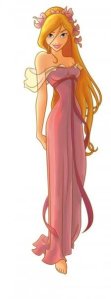
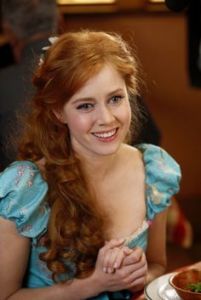
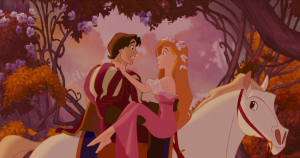
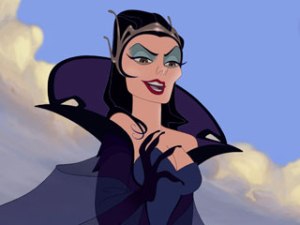
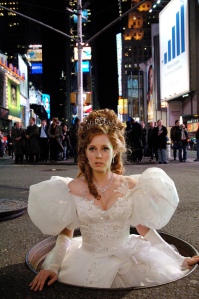
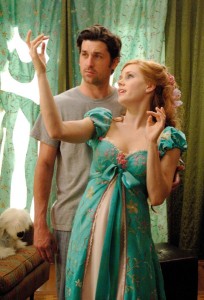
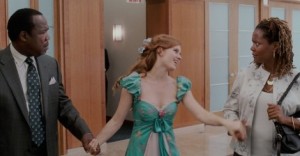
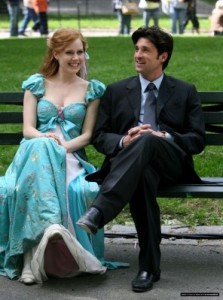
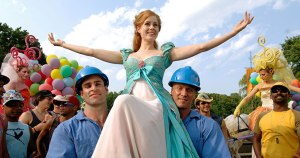
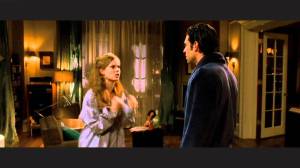
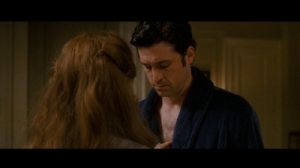
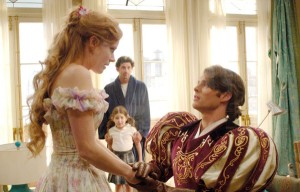
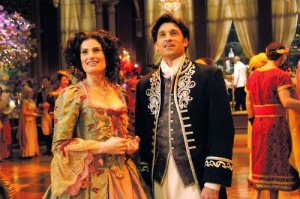
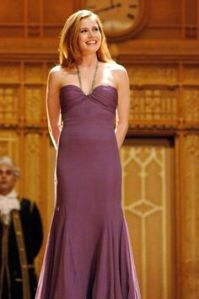
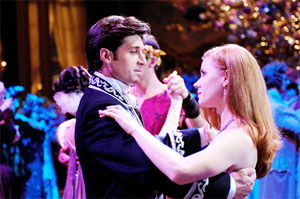
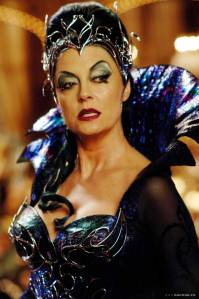
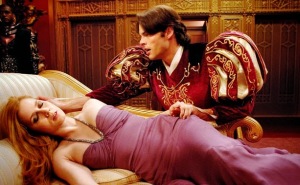
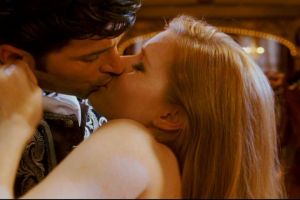
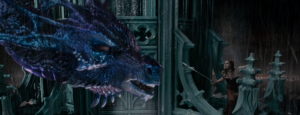
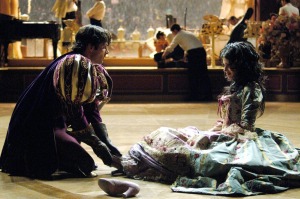
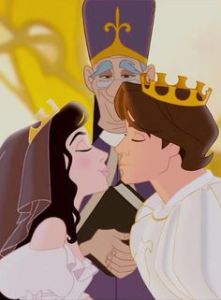
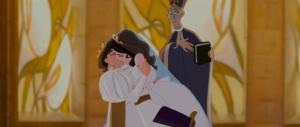
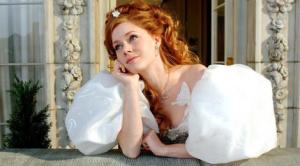
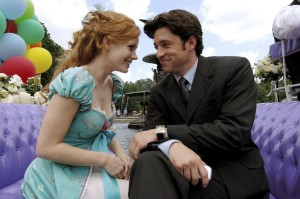
I like your website, I think you made beautiful analysis for each film. This one about Giselle and the ones about Ariel, Belle, Tiana, Rapunzel, Pocahotas and Mia are my favorites.
Back to Giselle. again, you made a beautiful anyalsis of her film and her character. I agree it’s about the balance between romantic optimism and practical reality and Giselle is jus that. she stayed herself but learned and grew which is how exactly how a good change and character development should be. I agree about the message that marriage or any romantic relationship should built upon an unconditional true love which I agree is a wonderful message. And I think that’s the point of the idea of love at first sight, if it’s true love we all should go for it even in such short time.
I disagree about Giselle from the beginning wouldn’t jump into action or that she’s “needs to be saved”. She defeated the troll on her own and outsmarted him, she also did fine in New York when she just got there. I think she learned through her journey in New York about how much she’s capable of and she never knew, Robert in danger gave her the courage. And I’m glad she had the moment to save him, showing that classic Princesses can save the day. About her anger I think she held her anger and learned to let it go, not that she didn’t knew what anger was. She was angry when the old man stole her tiara and she didn’t seemed surprised she felt something differet.
And the beginning didn’t felt that lazy or unoriginal to me,of course that would have to add some twists anyway. Frozen for example felt to me personally lazy and unoriginal but that’s my personal opinion.
Also could you write an article about Alice Kingsleigh from Tim Burton’s Alice In Wonderland? It’s my favorite live action movie and I would to read your opinion about her.
Anyway, great article and lovely website.
LikeLike